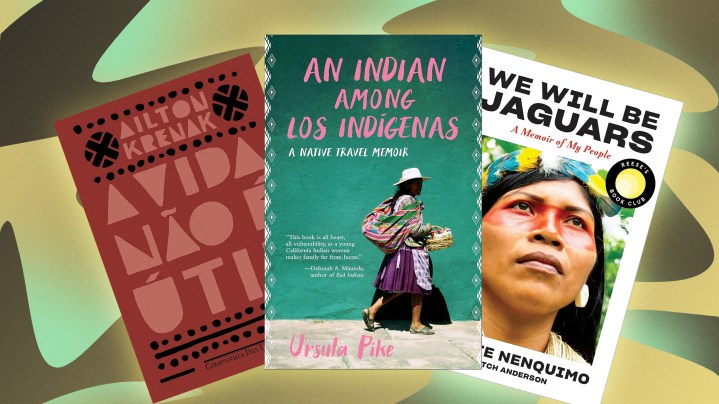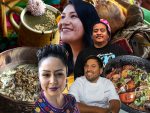7 Essential Books to Honor Indigenous Peoples All Year Long

Art by Stephany Torres
Our curated collection of Indigenous authors spotlights storytelling as a vital expression of resistance and perseverance. These multifaceted genres explore themes of identity, ingenuity, and cultural and environmental preservation, illuminating shared hopes and diverse reflections of Native people throughout Latin America or with a connection to its lands. And it’s an opportunity to learn about these communities beyond Indigenous Peoples’ Heritage Month and celebrate them all year long.
We Will Be Jaguars: A Memoir of My People
In this passionate memoir, Waorani leader Nemonte Nenquimo shares the journey from her childhood upbringing in the Amazon to becoming an influential environmental activist. Interlacing personal experiences with the wisdom of her community’s oral histories, she chronicles their ongoing resistance against colonialism in Ecuador’s rainforest. Nenquimo’s compelling narrative asks, “What will you do with my story now that it’s been written?… I hope you will let it live.” Underscoring that protecting Indigenous lands, culture, and rights is inseparable from humanity’s survival.
This spine-chilling anthology redefines horror through Indigenous narratives, blending supernatural legends and warnings with modern fears. It invites you to sit by the fire, guided by the eerie glow as the gripping tales of Native hauntings, shapeshifters, and spirits unfold. Written by acclaimed Indigenous authors, including Pueblo and Xicana writer Dani Trujillo, each story delves into the dangers of disregarding sacred knowledge, delivering unsettling and unforgettable scares that reveal an eerie candor about survival, trauma, and resilience.
An Indian Among Los Indígenas: A Native Travel Memoir
Traversing the intricate intersections of identity, colonialism, and development work, Ursula Pike’s compelling travel narrative recounts her Peace Corps experience in Bolivia. As a Native North American woman of the Karuk Tribe working alongside Bolivia’s Indigenous Quechua and Aymara communities, she grapples with the paradox of being both a descendant of colonized peoples and a representative of a Western aid organization. Through her journey, Pike challenges assumptions about indigeneity, solidarity, and the meaning of service, all while confronting the enduring impacts of historical and systemic inequalities.
Intergalactic Travels: Poems from a Fugitive Alien
Afro-Zapoteca poet Alán Pelaez Lopez crafts a groundbreaking meditation on migration, queerness, and survival through an imaginative cosmic lens. Drawing from their experience of growing up undocumented, Lopez’s poetry maps the complex cartographies of displacement through visual art and personal odyssey, exposing the broader histories of colonialism and structural violence. This poetic collection redefines traditional boundaries of genre and identity, challenging norms of belonging and transforming personal struggle into a radical testament of resistance against erasure.
Metzali: Siwayul Shitajkwilu – Indigenous: Heart of a Womxn Writing
The inaugural poetry collection by Nawat Two-Spirit author Xemiyulu Manibusan Tapepechul is a compilation that braids multilingual poems in English, Spanish, and Nawat. Through deep introspection, the author presents a conversion of her experiences that are framed through open letters. She addresses communities and individuals to convey a spectrum of emotions—from raw anger and profound hurt to unbridled joy and tender love. Tapepechul illustrates her journey as a Native trans woman, not only revealing the challenges she has faced but also impassioned insights and personal growth through the complexity of her cultural heritage.
Ananí and the Cave of Cacibajagua
Taíno and Maya author Selena Lapham pens a sweeping magical realism tale, blending mesmerizing mythology with meaningful history. This bilingual children’s book, written in both Taíno Borikenaíki and English, follows a young woman on a transformative and courageous quest to reclaim her ancestral legacy. As Anaí ventures into the mystical depths of a legendary cave, she confronts spiritual forces and uncovers the long-hidden clues that bind her present to the island’s sacred and storied past.
Life Is Not Useful
Indigenous environmental leader Ailton Krenak challenges the relentless pursuit of productivity, drawing on the heritage and philosophy of his Krenak people in Brazil to reimagine our connection with the world. His work serves as a unique self-help guide, inviting readers to pause and rediscover a more balanced way of living by transcending modern chaos through cultivating inner peace and a deeper understanding of our place within nature’s order.
